|
12月11日早上9點,我走進離伊利華報報社不到5分鐘的BOB EVANS
餐館,我看到我先生和楊惟已經在那里等候我了,也許是昨晩楊惟在克里夫蘭的成功演出讓他還沉浸在興奮之中,加上我們又是上海老鄉,我的先生和他妹妹又是上海中學高中同窗同學,大家自然增添了幾分默契。我們的話題也很自然談到在美國弘揚中國傳統文化的艱難。
我們的話題很自然説到一起,在海外要靠單一的力量來宣傳中國文化很艱辛,就看伊利華報已經做了八年了,經濟上還是靠不住。那么在美國有多少人學習民族樂器琵琶?我吿訴楊惟,早在伊利華報剛出版時,一位在中國還比較有名氣的小提琴家來刋登廣吿,記得他説很多孩子學鋼琴,沒有人學小提琴,他還對我説,一個樂團有許多小提琴手,但鋼琴只需要一位,我説讓孩子學鋼琴,不是要培養他成爲專業鋼琴家,只是讓孩子學點音樂,更重要的還有,看到別家的孩子都在學習,自己不讓孩子學心里過不去。你説現在在美國讓孩子學琵琶那眞的還是有一定的難度。不過我們都應該有信心,因爲現在中國文化很時尙,讓我們吃飽肚子還是不成問題。
楊惟一踏進伊利華報報社就讚不絶口説:小小報館有文化層次。無意間他看到華報在8月份報道:著名大提琴演奏家馬友友領隊的一個新型樂隊,在Hudson露天廣場花園布來森演奏,命名“絲綢之路”組合,讓上千觀衆享受了一場頂級水平的音樂會。其中楊惟就是擔任琵琶的演奏家。記得那場音樂會與衆不同,整個樂隊的組合是來自各國的演奏家、樂器和曲目新鮮獨特,標題醒目,中國的民族樂曲演奏家吳桐的笙,印度的打擊樂,還有伊朗特色的拉絃樂器、吹奏樂器和熟悉的中國民族樂器琵琶、西方的絃樂一族小提琴、中提琴、大提琴和低音提琴還有吉他,加上演奏人員均是一流水準,演奏的曲目豐富多彩,其風格從絲綢之路那一端充滿地中海風情的阿爾巴尼亞狂歡舞曲,體現一路上不同文化元素的音符。
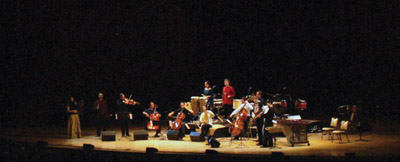
楊惟在克城演出《絲綢之路》時彈奏琵琶(中間穿白色衣服者)
世界很小,那天我還在後台採訪,我是與楊惟擦肩而過,而今天我們這么有緣,是弘揚中國文化讓我們互相零距離的交流,我看着楊惟手捧琵琶,想到這不是中國的吉他嗎?我馬上想到本報一直在幫忙ITM設想如何奏響中西搖滾來弘揚中國龍,我的想法讓楊惟一陣興奮,我會推薦他給ITM總裁。
楊惟1960年出生於上海,自幼學習民族樂器,十三歲起專功琵琶,曾先後隨陳宏仁、畢志光、謝家國、林石城、湯良興、孫裕德、馬聖龍、秦鵬章、龔萬里、葉緒然、劉德海等名師學習。
楊惟在琵琶演奏藝術的探索中注意博採衆藝,不斷豐富、充實自己。他的演奏音質純凈,技術純熟,藝術處理細膩感人,音樂表現富有激情。
楊惟曾多次獲琵琶比賽優秀奬、表演奬:1980年在“上海之春”全國琵琶比賽中獲三等奬;1982年在“全國民族器樂獨奏觀摩會演”中獲優秀表演奬;1985年在“上海市靑年演員(歌劇、器樂)會演”中獲優秀奬;1989年在“ART杯中國樂器國際比賽”中獲琵琶靑年專業組一等奬。
楊惟于1990年10月、1992年11月分別在上海、台北舉行獨奏音樂會,受到好評,其演奏作品所録制的音帶、唱片《瀛洲古調》等流傳國內外。楊惟曾先後走訪過法國、比利時、新加坡等國家和地區,普遍得到很高的評價。
當楊惟離開伊利華報報社的時候,他再三説我們做的事情很有意義,尤其是一個人帶着激情去做自己喜愛的事業,更重要的是屬於民族文化的事情就等於屬於世界的。
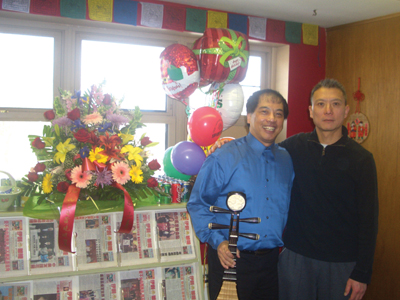
楊惟與陸一靑
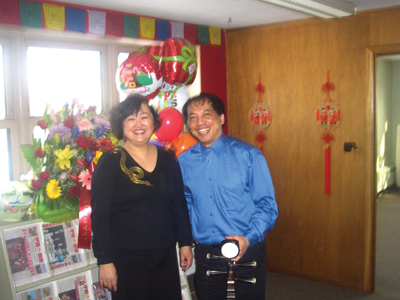
楊惟與浦瑛
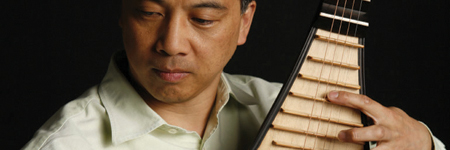
Yang Wei began his musiYang Wei’s musical
education began at the early age of 6. As a young student of music,
he received instruction in several different classical Chinese
instruments. At 13, the decision was made to concentrate his
considerable talents upon mastering the Pipa. The years of study and
dedication began to pay off when at 18 he performed as a soloist
with the National Shanghai Orchestra. This accomplishment was
followed by his achievement of the ART Trophy First Prize for the
International Chinese Musical Instruments Competition, in the Young
Professional Pipa Section, which he was awarded in 1989.
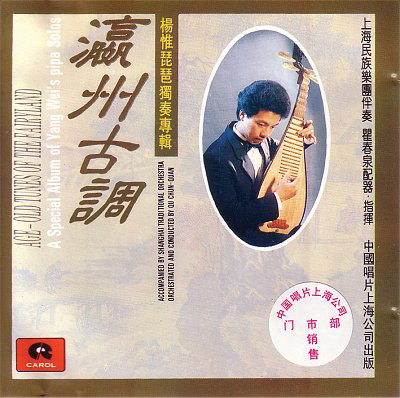
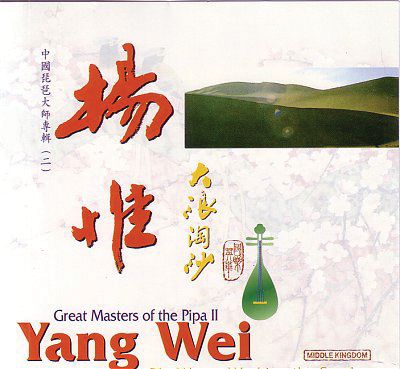
As a professional musician he has been celebrated worldwide,
performing for and inspiring audiences throughout Asia, Europe, and
the United States. His professional activities have included
performing as a soloist with various orchestras and in various
ensembles, teaching and participating in educational programs in
both public and educational settings. Since 2000, Yang Wei has
toured with the acclaimed, Silk Road Project, performing alongside
world famous cellist, Yo Yo Ma. In the United States, he has
performed at such known venues as the Ravinia International Music
Festival, the Kimmel Center, the Lincoln Center and the Chicago
Symphony Center. In addition to these performances, he has served as
Artist-in-Residence for the Art Institute of Chicago and has led
international music lectures. He has been instrumental in
commissioning new works by Chinese composers such as Bright Sheng,
Zhu Jian-er, Gabriela Lena Frank, and Yao Chen.
In 1996, Yang Wei moved permanently to the United States, making his
home in the Chicago area. Yang Wei's artistic perspective is an
interesting one that honors the musical heritage of his homeland in
China, but also combines the Western influences of his new home. He
has engaged in various collaborations with other artists blending
the sound of his pipa with western instruments and themes. He is
noted for and has been enthusiastically received for his
collaboration of the pipa with the double bass in the ensemble group
he formed called Qi Lin.
Additional accomplishments include his reception of a Fellowship in
Ethnic and Folk Arts by the Illinois Arts Council in 2006, and his
participation in a residency at the Humanity Institute of the
University of Michigan in both 2006 and 2007. Also in 2007, Yang Wei
sponsored a major collaborative performance with his great mentor,
Master Liu Dehai, at the Art Institute of Chicago. He has appeared
on the David Letterman Show and on Good Morning America with the
Silk Road Project, with which he also performed in Europe in 2007.
Mr. Yang continues to develop his art through comprehensive study,
as well as through his involvement in timely and new collaborations.
He is committed to sharing his music with the community around him
and continues to be interested in exploring the possibilities
created by blending his eastern instrument with western influences
and themes.
|